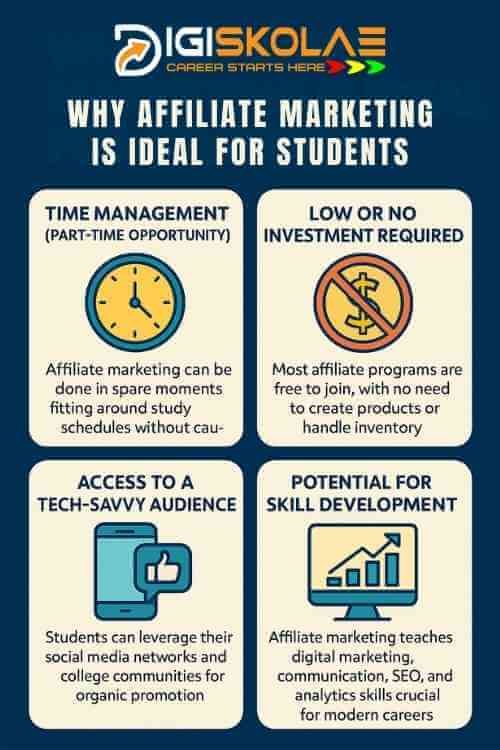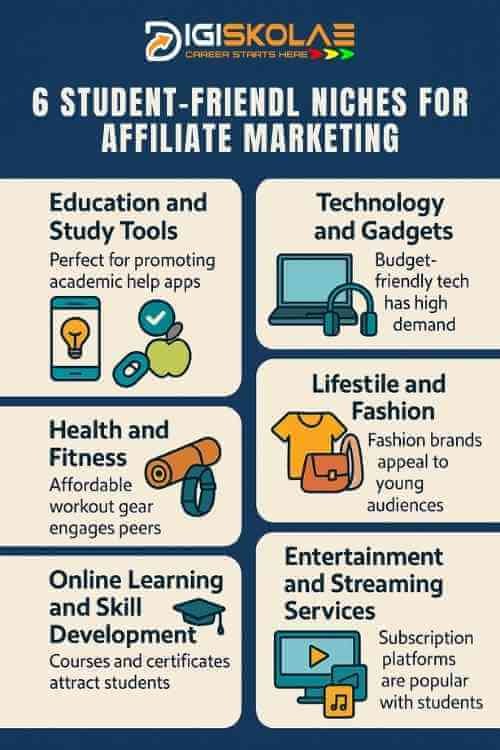Affiliate marketing provides students with a flexible way to earn money online by promoting products or services from various companies. Instead of a traditional part-time job, students can partner with brands and earn a commission each time someone purchases through their unique affiliate link. The best part? You can start from your dorm room, using your smartphone or laptop, and work around your class schedule. For example, students have successfully earned by sharing honest product reviews or useful recommendations on social media and blogs. While income potential varies, committed student affiliates can make from a few hundred to several thousand rupees monthly by leveraging popular programs like Amazon Associates or Clickbank
What is Affiliate Marketing?
Affiliate marketing is a simple way for students to earn money by promoting other people’s products and earning a commission for every sale made through their unique link. Here’s how it works: a student finds a company with products that match their interests and signs up for its affiliate program. The company provides a special tracking link. The student then shares this link with friends, family, or followers on social media, blogs, or WhatsApp groups. If someone clicks the link and makes a purchase, the student gets paid a small percentage of the sale. For example, using Amazon Associates, a student can earn a 5% commission on anything sold through their referral. The process is transparent—shoppers know they are using an affiliate link, maintaining trust and honesty in the relationship. This method is easy to start and requires no major upfront investment, making it ideal for students.
Why Affiliate Marketing is Ideal for Students

Affiliate marketing is an excellent fit for students because it offers flexibility, low startup costs, and a chance to tap into their natural tech-savvy skills. Unlike traditional part-time jobs, affiliate marketing allows students to manage their time effectively while still earning income. It requires no heavy investment, making it accessible to anyone with a smartphone or computer. Additionally, students already have access to a tech-savvy audience—peers who are active on social media and digital platforms—making it easier to promote products authentically. Finally, engaging in affiliate marketing helps students develop valuable digital skills like content creation, marketing, and communication, which can pave the way for future career opportunities in online business or marketing fields.
- Time Management (Part-Time Opportunity): Affiliate marketing can be done in spare moments, fitting around study schedules without causing burnout.
- Low or No Investment Required: Most affiliate programs are free to join, with no need to create products or handle inventory.
- Access to a Tech-Savvy Audience: Students can leverage their social media networks and college communities for organic promotion.
- Potential for Skill Development: Affiliate marketing teaches digital marketing, communication, SEO, and analytics skills crucial for modern careers.
How to Get Started: Step-by-Step Guide for Affiliate Marketing
Start with what you already know or enjoy—your studies, hobbies, or daily interests can lead to the best affiliate marketing niches. For example, if you’re a tech student, promoting software or gadgets may be a natural fit, while a literature student could review eBooks or online writing tools. Use Google Trends or Keyword Planner to check if your chosen topic has an active audience. Focus on niches that have both consistent interest and buying potential, such as technology, education tools, fashion, health, or finance. Selecting a niche you’re passionate about makes content creation easier and keeps your audience engaged.
Picking the right affiliate programs (examples: Amazon, Flipkart, Grammarly, Canva, Chegg, Apple Music)
When starting, beginners should join trusted, high-conversion affiliate programs. Amazon Associates, Flipkart, and Clickbank are great choices for beginners due to their variety and credibility. If you create educational content, platforms like Chegg and Grammarly are perfect, while Canva suits students in design or content creation niches. Always read program terms—focus on those that offer reliable tracking, transparent commission structures, and prompt payment schedules. Choose programs your potential followers already trust—it builds authenticity and boosts earnings.
How to sign up as a student affiliate
Signing up for affiliate programs is simple. Visit your chosen platform’s affiliate page (like Amazon Associates or Flipkart Affiliates), create an account using your basic details, and share your website, blog, or social media link as your promotional channel. Some programs like Canva or Grammarly also allow direct social media promotion without requiring a website. Once approved, you’ll get your unique affiliate links. Keep learning from each program’s dashboard—it shows traffic, conversions, and payouts that help improve future promotions.
Building a simple online presence
To succeed, establish a small digital presence where you can share your affiliate content. Students can start with free platforms like WordPress blogs, YouTube channels, or Instagram accounts. Consistently share honest reviews, product comparisons, or tutorials that connect with your audience’s interests. For example, a YouTube video reviewing study tools or a short Instagram reel about “students’ favorite learning apps” can attract organic traffic. You can also use WhatsApp or Telegram groups to share recommendations among classmates and peers, building engagement and credibility over time.
6 student-friendly niche for Affiliate Marketing

Here are six student-friendly affiliate marketing niches, each explained in one sentence to show why it fits students best:
- Education and Study Tools: Perfect for students who can promote apps like Grammarly, Coursera, or Chegg to peers looking for academic help.
- Technology and Gadgets: Students love discovering new tech — promoting budget-friendly laptops, headphones, or productivity tools makes content relatable and high-demand.
- Health and Fitness: With more students embracing self-care, sharing affordable workout gear, healthy snacks, or fitness trackers builds engagement and trust.
- Lifestyle and Fashion: Trendy apparel, accessories, and student-budget brands appeal to young audiences while offering frequent affiliate sales opportunities.
- Online Learning and Skill Development: Students can earn by recommending courses and certifications on platforms like Udemy, Skillshare, or Google Career Certificates.
- Entertainment and Streaming Services: Promoting affordable subscriptions like Spotify, Apple Music, or Netflix resonates well with peers who are already active users.
Proven Strategies to Succeed as a Student Affiliate
Succeeding as a student affiliate marketer requires smart planning, creativity, and consistency. With limited time and resources, focusing on authentic content and building trust with your audience can make all the difference. Using relatable experiences, student networks, and basic SEO practices, you can turn your efforts into consistent earnings without heavy investment or complex tools.
Content ideas: Product reviews, personal experiences, listicles, and social media posts. Write honest product reviews based on your real usage or peer feedback to establish authenticity.
Share personal experiences — for example, how a tool improved your studies or daily routine.
Create listicles such as “Top 5 Study Tools Every Student Needs” — these are engaging and SEO-friendly.
Use social media posts like short Instagram reels, YouTube Shorts, or Twitter threads to reach peers quickly and visually.
Leveraging student communities (campus forums, WhatsApp, Telegram groups). Join and actively participate in student groups where you can recommend useful tools or services.
Organize small polls or surveys to discover what your peers find valuable before promoting it.
Focus on discussion-based promotion rather than direct selling to maintain trust within your community.
SEO, social media, and word-of-mouth tactics. Optimize your blog or YouTube descriptions using keywords like “best student apps” or “affordable gadgets.”
Maintain posting frequency on social platforms for consistent visibility. Encourage word-of-mouth by offering value first — share study tips or guides that naturally introduce your affiliate links.
Real-Life Examples
Several Indian students and young digital creators have achieved success through affiliate marketing, proving it’s a realistic way to build income while studying. For instance, Yamini Gaba, a college student, built her brand around affiliate programs and digital products, scaling her monthly revenue to over ₹1.5 lakh using Instagram and Telegram groups for promotions. In another inspiring example, Harsh Agrawal, founder of ShoutMeLoud, started as an engineering student in Delhi and now earns over ₹25 lakh per month by promoting products like Bluehost and Semrush on his blog. Data from Indian affiliate platforms such as Amazon Associates and Flipkart Affiliates show that consistent student affiliates can earn ₹10,000–₹60,000 per month with proper traffic and conversion strategies. Programs like CashKaro also offer up to 10% cashback commissions, making them ideal for student beginners looking to build passive income and learn digital marketing hands-on.
Common Mistakes to Avoid
Many students who start in affiliate marketing make small but costly mistakes that can limit their growth. These errors often come from rushing to earn quick money instead of building genuine trust with their audience. To create a sustainable income, student affiliates need to stay authentic, transparent, and audience-focused. Avoiding these mistakes can help maintain credibility, improve conversions, and build a stronger online presence over time.
Focusing on Too Many Products
Promoting too many products at once can confuse your audience and make your content look spammy. Instead, focus on 2–3 relevant products that align with your niche and interests. For example, a student in the education domain can stick to tools like Grammarly, Canva, and Coursera, promoting them through practical content like “How to Boost Productivity in College.”
Not Disclosing Affiliate Links
Hiding the fact that you earn from affiliate links may hurt your credibility and even lead to compliance issues. Being honest builds trust—simply state that your content contains affiliate links and you may earn a small commission. In India, platforms like the Advertising Standards Council (ASCI) encourage creators to use clear disclosures such as “This post contains affiliate links.”
Ignoring Audience Needs and Feedback
Many beginners overlook what their audience actually wants and promote random products. Always take time to research and ask your peers or followers for feedback on what they find useful. Use analytics, polls, or comments to understand which content performs best, and focus on solving real problems rather than just selling.
Tips to Stay Consistent and Ethical
Staying consistent and ethical is the backbone of long-term success in affiliate marketing, especially for students building trust among peers. Following Google’s E-E-A-T principles (Experience, Expertise, Authoritativeness, and Trustworthiness) ensures your content remains credible and ranks well. Regular posting, ethical promotion, and transparency help your audience see you as reliable—not just another promoter trying to sell products. Always share your personal experience with products, include data or insights from credible sources, and be honest about both pros and cons. Being transparent about affiliate links also builds authenticity; a simple disclaimer like “this post contains affiliate links” keeps your audience informed and reinforces trust. Over time, this honesty and dedication to quality create a strong reputation—helping you sustain engagement, improve conversions, and grow a loyal community that genuinely values your recommendations.
Conclusion
Affiliate marketing offers students a golden opportunity to learn marketing skills, earn income, and build an online career — all while studying. The key to sustained success lies in being consistent, staying curious, and continuously learning new digital strategies. As the affiliate industry in India grows rapidly, students who start now gain early experience in content creation, SEO, and online branding — skills that will remain valuable for years to come. To succeed long-term, stay ethical, share genuine experiences, and focus on helping your audience make informed choices.
If you’re serious about strengthening your digital marketing skills, enrolling in a Digital Marketing Course at Digiskolae can be a game-changer. Their practical training covers SEO, social media marketing, Google Ads, and affiliate marketing — everything students need to grow as confident Affiliate Marketer. With hands-on projects and expert mentorship, Digiskolae helps you go beyond theory and turn digital marketing knowledge into real income opportunities.
